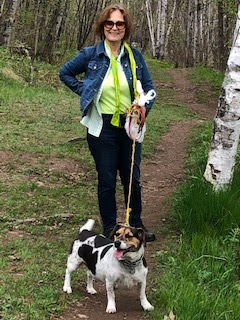By Naomi Yaeger
Spending time outside in nature can heal you, both physically and mentally.
During COVID lockdown, Terry and I took many walks with our dog. We noticed budding leaves and flowers, then spring arrived. In the summer, as Terry continued to work from home, we continued to walk. Soon Autumn arrived. The same leaves, which were buds, were now turning yellow, orange, or red and falling.
In December, I donated to the Nature Conservancy. With my donation, they invited me to attend a nearby event. The closest one I could find was a Zoom presentation titled," Why Nature Makes Us Happier, Healthier, and More Creative." The featured speaker is Florence Williams, author of "The Nature Fix." She's also written several magazine articles such as "Is Your Noisy Neighborhood Slowly Killing You?" in Mother Jones, and "Fight the Winter Blues, Find a Dose of Nature." in the Wall Street Journal, and "Take Two Hours of Pine Forest and Call me in the Morning," Outside Magazine.
According to Outside magazine, "Florence Williams travels to the deep woods of Japan, where researchers are backing up the theory that nature can lower your blood pressure, fight off depression—and even prevent cancer."
The Japanese are seriously researching how "forest bathing" affects health. This reminds me of the Bible stories of Jesus spending time in nature when he had a big decision to make. I recall specific significant transitions in life when I've spent time in nature.
The COVID shutdowns spurred Terry, our dog, and me to walk nature trails near our home. We feel better after a walk.
Shh, don't tell Terry, he's getting his Christmas wish -- walking sticks.
Learn the scientific reasons for feeling better with time in nature: join me, read Florence Williams' "The Nature Fix," or visit her website at www.FlorenceWilliams.com.
 |
| Terry walking with MaggieBW in the CSS woods. |
 |
| Terry walking with a stick down an unused ski hill in the spring. |









